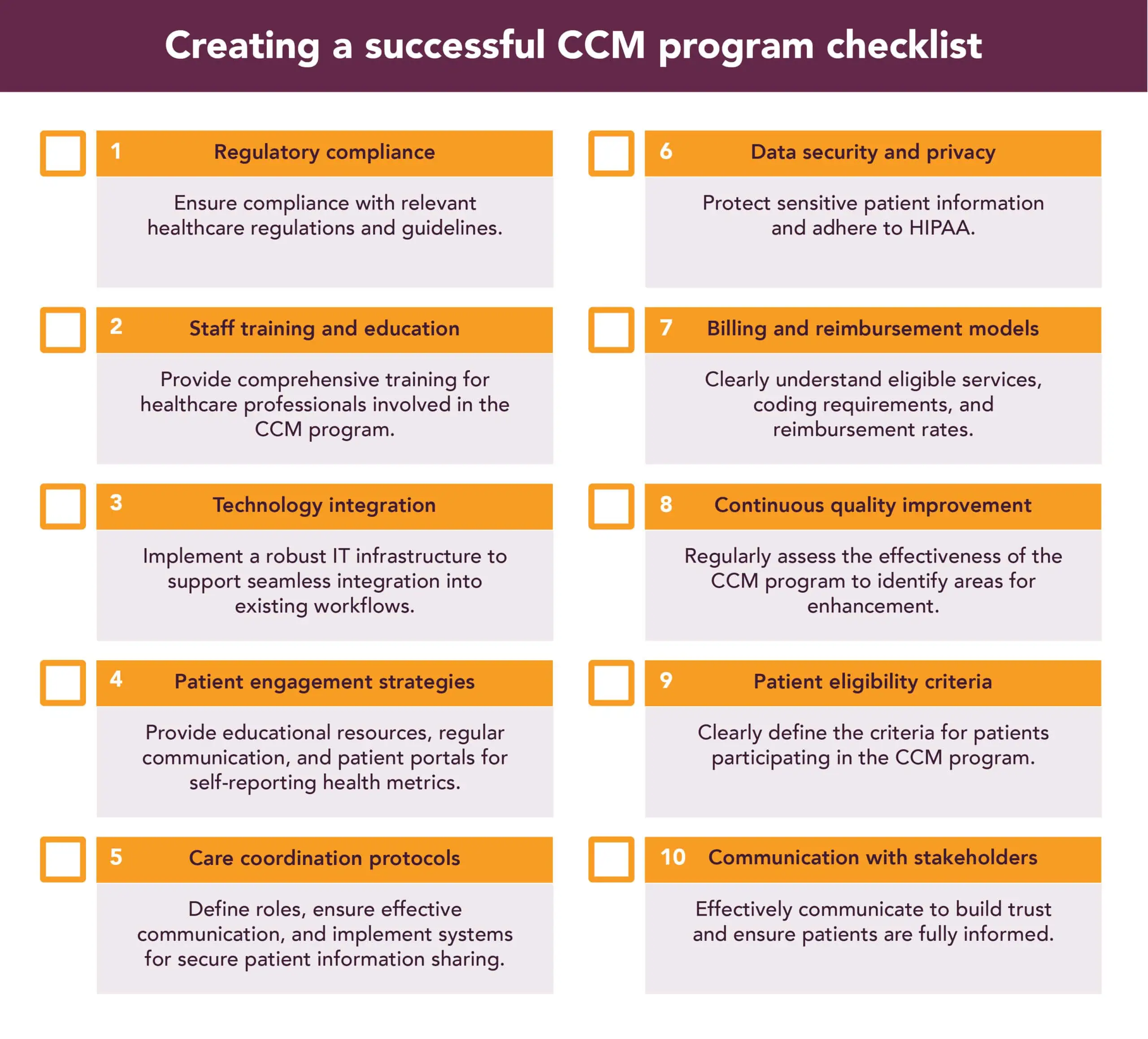What is chronic care management (CCM)? CCM is a healthcare model that involves placing patients with chronic conditions into a program that provides continuous and coordinated care to manage their conditions. These conditions, such as diabetes, hypertension, heart disease, and others, require ongoing medical attention, support, and lifestyle management.
CCM aims to enhance the quality of care provided to individuals with chronic illnesses by fostering collaboration among healthcare professionals, utilizing technology, and engaging patients in their healthcare journey.
Who benefits from CCM?
Patients with chronic conditions: CCM benefits individuals with long-term health issues. It ensures they receive consistent and personalized care beyond sporadic visits to healthcare providers.
The program helps manage symptoms, prevent complications, and improve overall health outcomes for patients dealing with chronic diseases.
Caregivers and family members: CCM involves a collaborative approach that often includes family and caregivers. This support network is integral to the well-being of individuals managing chronic conditions.
Caregivers benefit from enhanced communication with healthcare professionals, access to educational resources, and a better understanding of the patient’s treatment plan.
Healthcare providers: CCM allows providers to deliver more effective and efficient care by closely monitoring and managing chronic conditions.
When done correctly, these programs can facilitate better communication among healthcare professionals, reduce care redundancy, and ensure a holistic approach to patient management.
CCM programs also create an additional stream of income, which is increasingly important for healthcare organizations looking to defend their bottom line.
Eligibility criteria for CCM programs
Not every patient is eligible for chronic care management services. Per Medicare, to qualify for these programs, a patient must:
1. Have multiple chronic conditions: Individuals dealing with two or more chronic conditions are often eligible for CCM programs. These may include diabetes, hypertension, heart disease, arthritis, etc.
2. Provide consent and participation: Providers must ensure they get and document their patients’ consent to participate in a CCM program.
Considerations for healthcare providers establishing a CCM program
Setting up a successful CCM program requires careful planning, strategic considerations, and a commitment to providing high-quality, patient-centered care.
Healthcare providers looking to implement a CCM program should take the following factors into account:
1. Regulatory compliance: Ensure compliance with relevant healthcare regulations and guidelines, including billing and reimbursement. Familiarize yourself with the specific requirements outlined by Medicare.
2. Staff training and education: Provide comprehensive training for healthcare professionals involved in the CCM program—including physicians, nurses, care coordinators, and administrative staff.
Training should cover program objectives, documentation requirements, and effective communication strategies. Some organizations also outsource this work to companies specializing in CCM.
3. Technology integration: Implement a robust healthcare information technology (IT) infrastructure to support the seamless integration of CCM into existing workflows. This may involve utilizing electronic health records (EHRs), telehealth platforms, and other digital tools for efficient data management and communication.
4. Patient engagement strategies: Develop effective strategies to engage patients in their care. These strategies may involve educational resources, regular communication, and patient portals or mobile apps for monitoring and self-reporting health metrics.
5. Care coordination protocols: Establish clear protocols for care coordination among healthcare team members. Define roles and responsibilities, ensure effective communication channels, and implement systems for sharing patient information securely.
6. Data security and privacy: Prioritize data security and patient privacy. Implement robust cybersecurity measures to protect sensitive patient information and adhere to relevant privacy regulations, such as the Health Insurance Portability and Accountability Act (HIPAA) in the United States.
7. Billing and reimbursement models: Understand the billing and reimbursement models associated with CCM. Ensure that your organization clearly understands the program’s financial aspects, including eligible services, coding requirements, and reimbursement rates.
8. Continuous quality improvement: Implement mechanisms for continuous quality improvement. Regularly assess and evaluate the effectiveness of the CCM program, gathering feedback from healthcare providers and patients to identify areas for enhancement.
9. Patient eligibility criteria: Clearly define the criteria for patients participating in the CCM program. As previously mentioned, this includes individuals with multiple chronic conditions and those who have consented.
10. Communication with stakeholders: Foster open communication with patients, caregivers, and other stakeholders. Transparent and effective communication is essential for building trust and ensuring that patients and their support networks are fully informed about the CCM program.
An agency that understands healthcare
As a healthcare tech marketing agency, it’s our job to deeply understand the industry and keep up with the latest trends.
We know that standing out in the crowded healthcare tech market is tough—we’re here to help.



